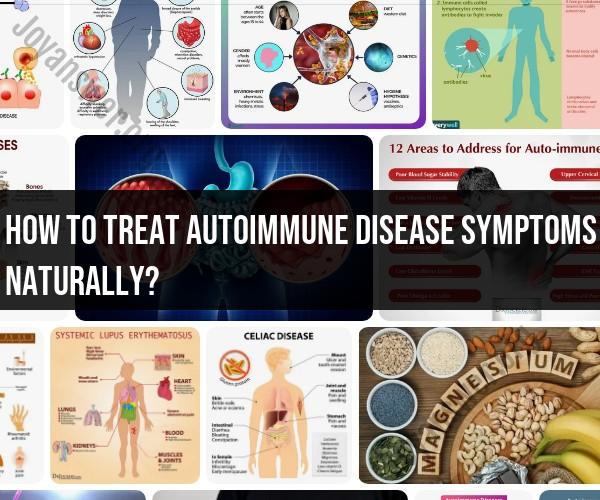How to treat autoimmune disease symptoms naturally?
Autoimmune diseases are complex conditions in which the immune system mistakenly attacks the body's own cells and tissues. While there is no cure for autoimmune diseases, natural approaches can help manage symptoms and improve overall well-being. It's essential to work closely with your healthcare provider and consider these natural strategies as complementary to medical treatment. Here are some natural approaches to managing autoimmune disease symptoms:
Dietary Changes:
- A balanced and anti-inflammatory diet can help reduce symptoms. Focus on whole, unprocessed foods, and consider:
- Omega-3 Fatty Acids: Found in fatty fish, flaxseeds, and walnuts, omega-3s have anti-inflammatory properties.
- Turmeric: Curcumin, found in turmeric, has natural anti-inflammatory effects.
- Probiotics: These can support gut health and immune function.
- Gluten-Free Diet: Some autoimmune diseases, like celiac disease, respond well to a gluten-free diet.
- A balanced and anti-inflammatory diet can help reduce symptoms. Focus on whole, unprocessed foods, and consider:
Stress Reduction:
- Chronic stress can exacerbate autoimmune symptoms. Consider stress-reduction techniques like meditation, yoga, deep breathing exercises, and mindfulness to manage stress and support the immune system.
Adequate Sleep:
- Prioritize getting enough sleep, as it plays a crucial role in overall health and immune system function. Aim for 7-9 hours of quality sleep per night.
Regular Exercise:
- Gentle, low-impact exercises like yoga, walking, or swimming can help reduce inflammation and boost overall health. Consult your healthcare provider before starting a new exercise regimen.
Supplements:
- Some supplements may help manage autoimmune symptoms, but consult your healthcare provider before taking any. Common supplements include vitamin D, probiotics, and fish oil.
Eliminate Toxins:
- Reducing exposure to environmental toxins can lessen the autoimmune response. Consider switching to natural cleaning products, avoiding tobacco smoke, and limiting exposure to pollutants.
Hydration:
- Staying properly hydrated is essential for overall health, including immune function. Drink an adequate amount of water each day.
Acupuncture and Traditional Chinese Medicine:
- Some people find relief from autoimmune symptoms through acupuncture, herbal remedies, and other Traditional Chinese Medicine practices.
Herbal Remedies:
- Some herbs like ginseng, ashwagandha, and licorice root may have immune-modulating properties. Consult with an herbalist or healthcare provider before using herbal remedies.
Mind-Body Techniques:
- Practices like biofeedback, guided imagery, and progressive muscle relaxation can help manage symptoms and reduce the autoimmune response.
Heat and Cold Therapies:
- Heat and cold treatments, such as warm baths and cold packs, can offer relief for pain and inflammation in specific areas.
Support Groups:
- Joining support groups or counseling can help you cope with the emotional and psychological challenges of living with an autoimmune disease.
Remember that autoimmune diseases vary greatly in their symptoms and severity. What works for one person may not work for another. It's crucial to work with your healthcare provider to develop a personalized treatment plan tailored to your specific condition. They can help you navigate natural approaches and determine their suitability for your situation.
How to treat autoimmune disease symptoms naturally
Natural treatments for autoimmune diseases can help to reduce inflammation, manage symptoms, and improve overall quality of life. However, it is important to note that there is no one-size-fits-all approach to natural treatment, and what works for one person may not work for another. It is also important to work with your healthcare professional before starting any new treatment, including natural treatments.
Here are some common natural remedies and approaches for managing autoimmune disease symptoms:
- Diet: A healthy diet is essential for managing any chronic condition, including autoimmune diseases. Eating a balanced diet that is rich in fruits, vegetables, and whole grains can help to reduce inflammation and boost the immune system. Some people with autoimmune diseases find that following a specific diet, such as an anti-inflammatory diet or a paleo diet, can be helpful.
- Supplements: Certain supplements, such as omega-3 fatty acids, probiotics, and vitamin D, may be helpful for managing autoimmune disease symptoms. It is important to talk to your healthcare professional before taking any supplements, as they can interact with medications or other supplements.
- Lifestyle changes: Certain lifestyle changes, such as getting regular exercise, managing stress, and getting enough sleep, can also help to manage autoimmune disease symptoms.
Guidance on lifestyle changes, dietary choices, and supplements for autoimmune conditions
Here are some specific tips for lifestyle changes, dietary choices, and supplements that may be helpful for autoimmune conditions:
- Lifestyle changes:
- Get regular exercise. Exercise can help to reduce inflammation and improve overall health. Aim for at least 30 minutes of moderate-intensity exercise most days of the week.
- Manage stress. Stress can worsen autoimmune disease symptoms. Find healthy ways to manage stress, such as exercise, yoga, or meditation.
- Get enough sleep. Sleep is essential for healing and repair. Aim for 7-8 hours of sleep per night.
- Dietary choices:
- Eat a balanced diet that is rich in fruits, vegetables, and whole grains.
- Limit processed foods, sugary drinks, and unhealthy fats.
- Consider following a specific diet, such as an anti-inflammatory diet or a paleo diet.
- Supplements:
- Omega-3 fatty acids: Omega-3 fatty acids have anti-inflammatory properties. Good sources of omega-3 fatty acids include fish, flaxseeds, and walnuts. You can also take an omega-3 supplement.
- Probiotics: Probiotics are beneficial bacteria that live in the gut. Probiotics can help to reduce inflammation and improve gut health. Good sources of probiotics include yogurt, kimchi, and sauerkraut. You can also take a probiotic supplement.
- Vitamin D: Vitamin D is important for immune function. Many people with autoimmune diseases have low levels of vitamin D. You can get vitamin D from sunlight, food, and supplements.
Benefits and potential limitations of natural treatments for autoimmune diseases
Natural treatments for autoimmune diseases offer a number of potential benefits, including:
- They can help to reduce inflammation and manage symptoms.
- They can improve overall quality of life.
- They may be less expensive than traditional medications.
- They may have fewer side effects than traditional medications.
However, it is important to note that natural treatments for autoimmune diseases also have some potential limitations, including:
- They may not be effective for everyone.
- They may interact with medications or other supplements.
- They may not be as well-studied as traditional medications.
How to work in collaboration with healthcare professionals while exploring natural treatments for autoimmune conditions
It is important to work with your healthcare professional before starting any new treatment, including natural treatments. Your healthcare professional can help you to determine if natural treatments are right for you and they can monitor your progress to make sure that you are responding well to treatment.
Here are some tips for working in collaboration with healthcare professionals while exploring natural treatments for autoimmune conditions:
- Be honest with your healthcare professional about all of the treatments that you are using, including both natural and traditional treatments.
- Ask your healthcare professional about the potential benefits and risks of any natural treatments that you are considering.
- Work with your healthcare professional to develop a treatment plan that is right for you.
- Monitor your symptoms and report any changes to your healthcare professional.
By working in collaboration with your healthcare professional, you can safely and effectively explore natural treatments for autoimmune diseases.












